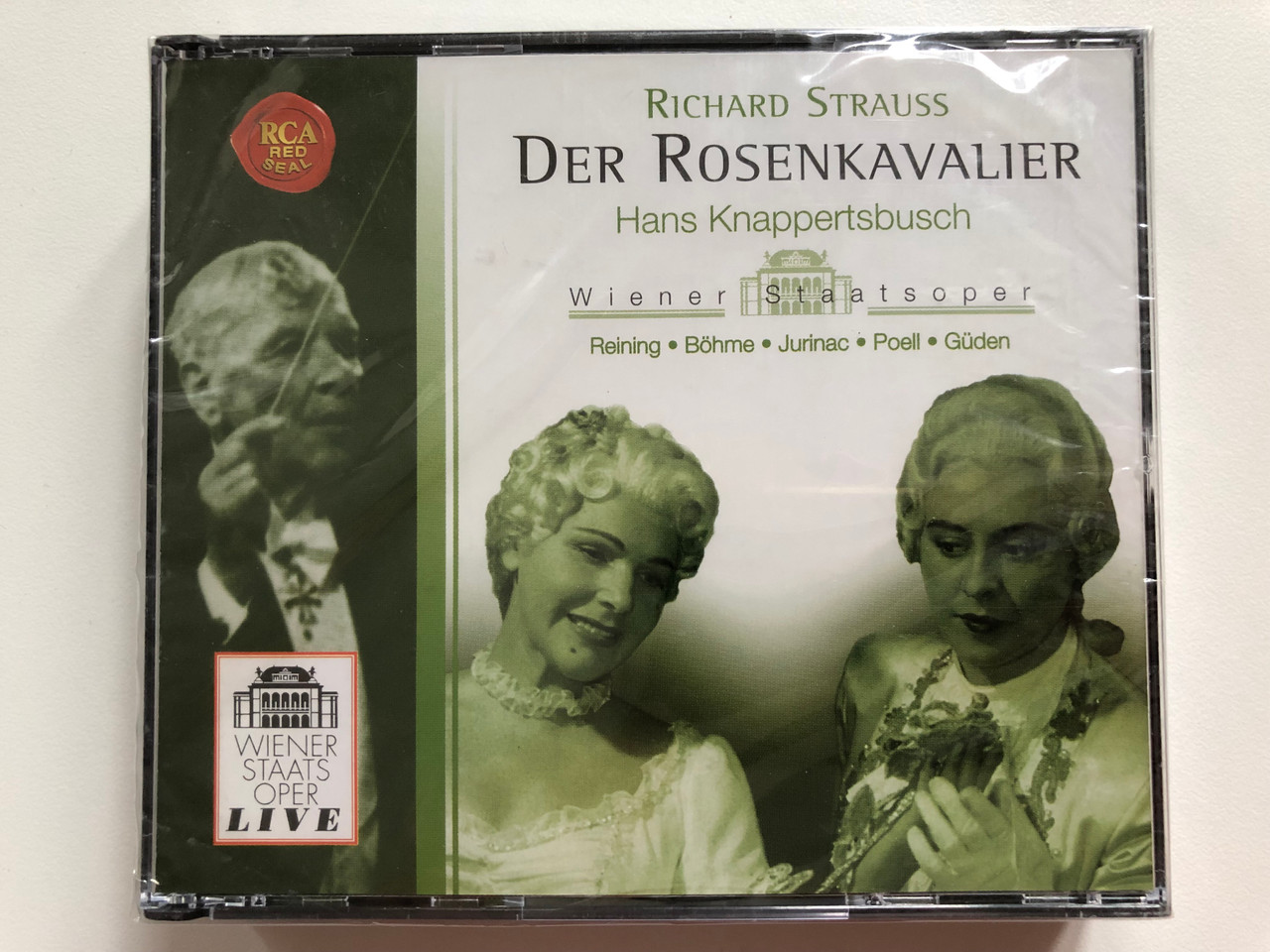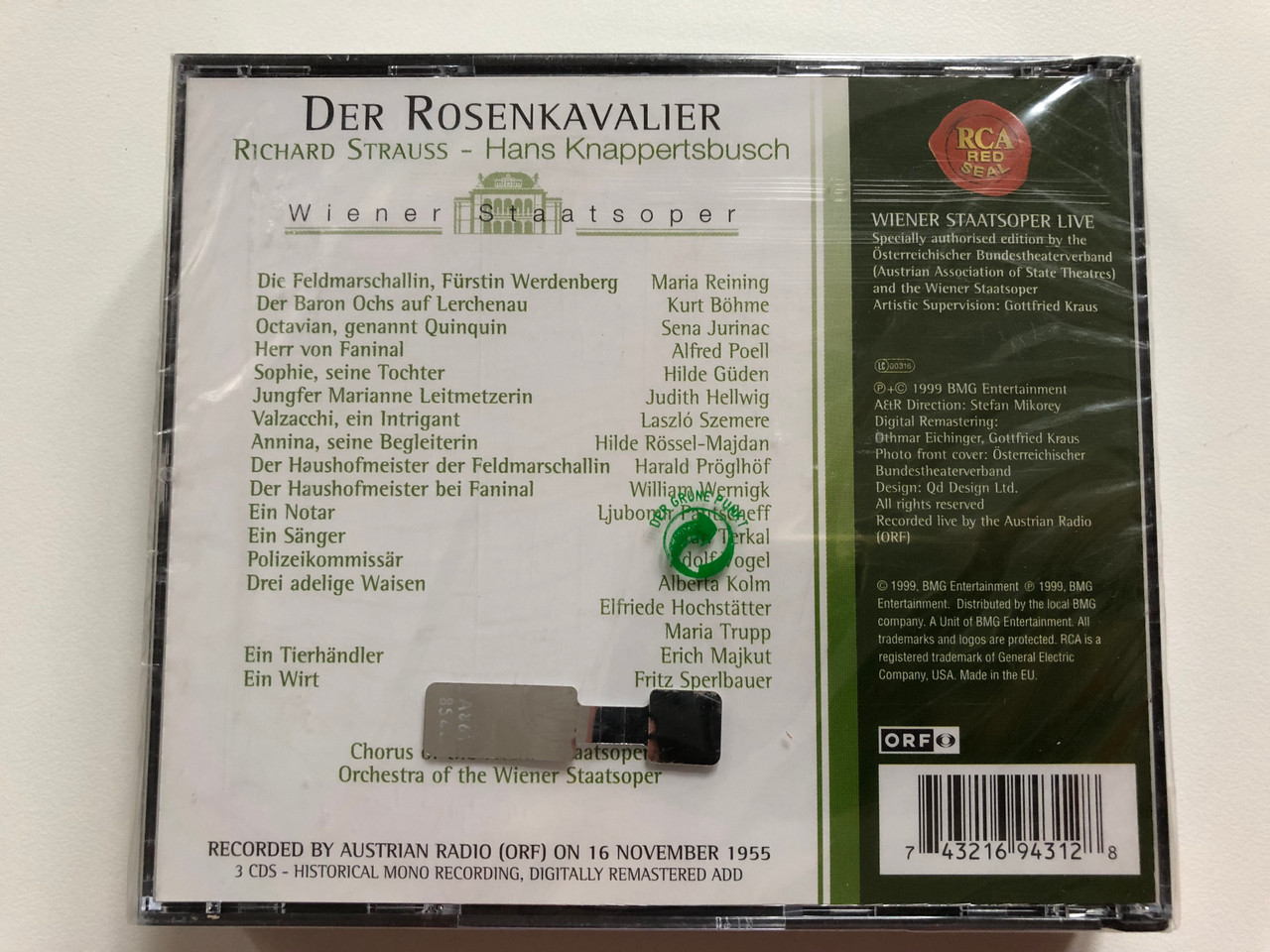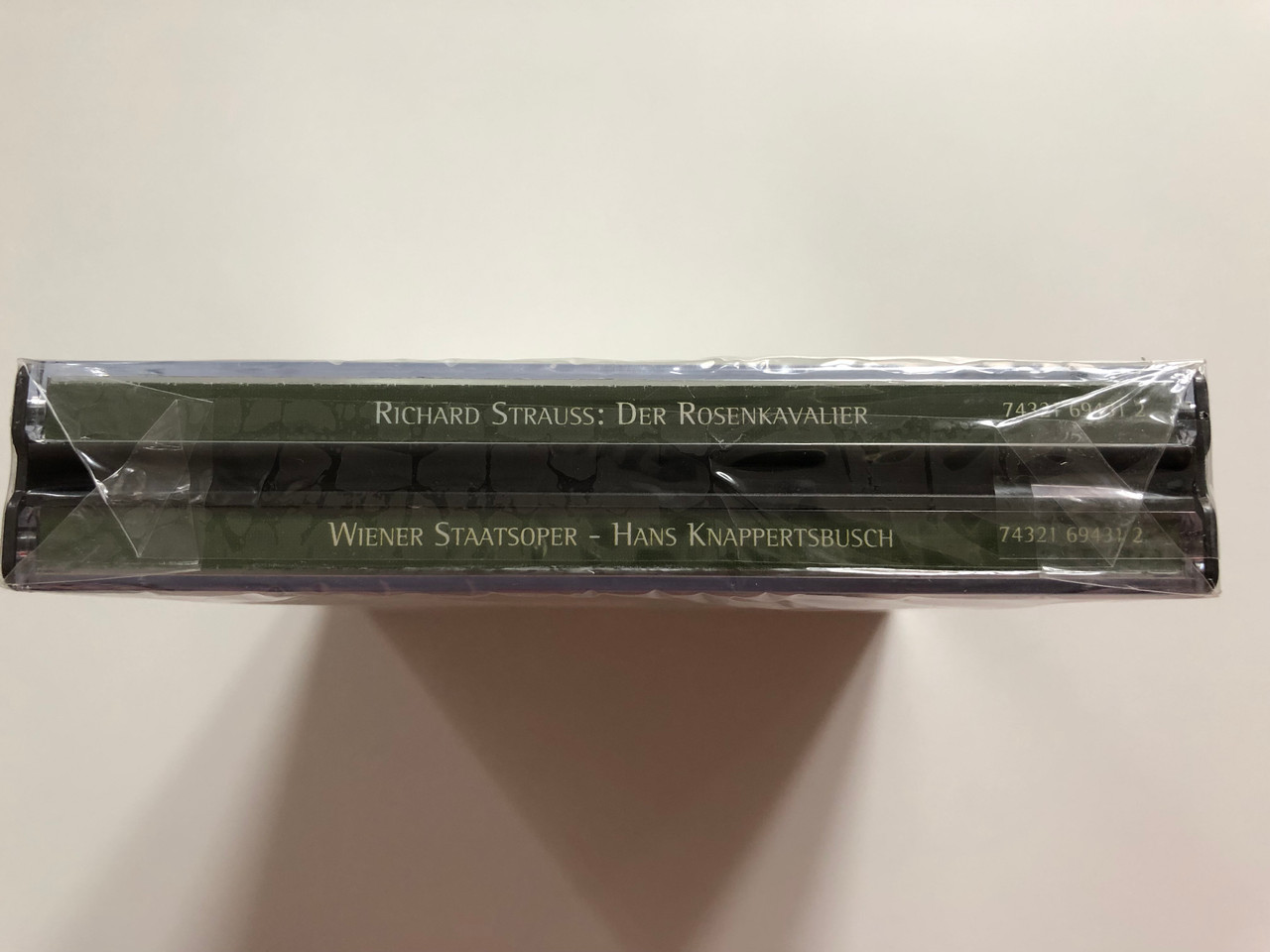Richard Strauss - Der Rosenkavalier - Hans Knappertsbusch / Wiener Staatsoper, Reining, Böhme, Jurinac, Poell, Güden / Wiener Staatsoper Live / RCA Red Seal 3x Audio CD 1999 / 74321 69431 2
UPC 743216943128
Der Rosenkavalier (The Knight of the Rose or The Rose-Bearer), Op. 59, is a comic opera in three acts by Richard Strauss to an original German libretto by Hugo von Hofmannsthal. It is loosely adapted from the novel Les amours du chevalier de Faublas by Louvet de Couvrai and Molière's comedy Monsieur de Pourceaugnac. It was first performed at the Königliches Opernhaus in Dresden on 26 January 1911 under the direction of Max Reinhardt, Ernst von Schuch conducting. Until the premiere, the working title was Ochs auf Lerchenau. (The choice of the name Ochs is not accidental, for in German "Ochs" means "ox", which describes the character of the Baron throughout the opera.)
The opera has four main characters: the aristocratic Marschallin; her very young lover, Count Octavian Rofrano; her brutish cousin Baron Ochs; and Ochs' prospective fiancée, Sophie von Faninal, the daughter of a rich bourgeois. At the Marschallin's suggestion, Octavian acts as Ochs' Rosenkavalier by presenting a ceremonial silver rose to Sophie. However, the young people fall in love on the spot, and soon devise a comic intrigue to extricate Sophie from her engagement. They accomplish this with help from the Marschallin, who then yields Octavian to the younger woman. Though a comic opera, the work incorporates some weighty themes (particularly through the Marschallin's character arc), including infidelity, aging, sexual predation, and selflessness in love (or the lack thereof).
Der Rosenkavalier is notable for its showcasing of the female voice, as its protagonists (light lyric soprano Sophie, mezzo-soprano Octavian, and the mature dramatic soprano Marschallin) are written to be portrayed by women, who share several duets as well as a trio at the opera's emotional climax. Some singers have performed two or even all three of these roles over the course of their careers.
There are many recordings of the opera and it is regularly performed.
Hans Knappertsbusch (12 March 1888 – 25 October 1965) was a German conductor, best known for his performances of the music of Wagner, Bruckner and Richard Strauss.
Knappertsbusch followed the traditional route for an aspiring conductor in Germany in the early 20th century, starting as a musical assistant and progressing to increasingly senior conducting posts. In 1922, at the age of 34, he was appointed general music director of the Bavarian State Opera, holding that post for eleven years. In 1936 the Nazi régime dismissed him. As a freelance he was a frequent guest conductor in Vienna and Bayreuth, where his performances of Parsifal became celebrated.
Studio recording did not suit Knappertsbusch, whose best-known recordings were made live during performances at Bayreuth. He died at the age of 77, following a bad fall the previous year.
| Label: |
RCA Red Seal – 74321 69431 2 |
|---|
| Series: |
Wiener Staatsoper Live |
|---|
| Format: |
3 x CD, Album
|
|---|
| Country: |
Europe |
|---|
Released:
|
1999 |
|---|
| Genre: |
Classical |
|---|
| Style: |
Modern, Opera |
|---|
Tracklist:
| |
|
Der Rosenkavalier, Opera, Op. 59 (TrV 227) |
|
| |
|
Act One |
|
| 1-2 |
|
Wie Du Warst Wie Du Bist |
7:48 |
| 1-4 |
|
Quinquin Es Ist Mein Mann |
3:29 |
| 1-5 |
|
Selbstverständlich Empfängt Mich Ihro Gnaden |
8:19 |
| 1-6 |
|
Hat Sie Schon Einmal Mit Einem kavalier |
6:18 |
| 1-7 |
|
Nein, Er Agiert Mir Gar Zu Gut |
3:39 |
| 1-9 |
|
Di Rigori Armato Il Seno |
2:54 |
| 1-11 |
|
Mein Lieber Hippolyte |
3:39 |
| 1-13 |
|
Ach, Du Bist Wieder Da! |
5:32 |
| 1-14 |
|
Die Zeit, Die Ist Ein Sonderbar Ding |
8:59 |
| 1-15 |
|
Ich hab Ihn Nicht Einmal Geküsst |
3:35 |
| |
|
Act Two
|
|
| 2-2 |
|
In Dieser Feierlichen Stunde |
3:35 |
| 2-3 |
|
Mir Ist Die Ehre Widerfahren |
6:14 |
| 2-4 |
|
Ich kenn Ihn Schon Recht Wohl, Mon Cousin |
3:44 |
| 2-5 |
|
Jetzt Aber Kommt Mein herr |
3:50 |
| 2-6 |
|
Eh Bien! Nun Plauder Sie Uns Eins |
6:59 |
| 2-7 |
|
Wird Sie Das Mannsbild Da Heiraten, Ma Cousine |
6:06 |
| 2-8 |
|
Herr Baron Von Lerchenau |
5:36 |
| 2-10 |
|
Herr Schwiegersohn |
3:13 |
| 2-12 |
|
ist Gut Ist Gut |
2:07 |
| 2-14 |
|
Ohne Mich, Ohne Mich Jeder Tag |
6:36 |
| |
|
Act Three
|
|
| 3-1 |
|
introduction And Pantomime |
5:51 |
| 3-2 |
|
Haben Euer Gnaden Noch Weitre Befehle |
4:08 |
| 3-3 |
|
Nein, Nein, Nein, Nein. I Trink Ka Wein |
6:47 |
| 3-4 |
|
Es Is Ja Eh Alls Ans |
2:56 |
| 3-5 |
|
Da Und Da Und Da |
4:20 |
| 3-6 |
|
Halt! Keiner Rührt Sich |
3:14 |
| 3-8 |
|
Sind Desto Eher Im Klaren |
2:29 |
| 3-9 |
|
Bin Glücklich Über Massen |
2:46 |
| 3-10 |
|
Lass Er Nur Gut Sein |
6:49 |
| 3-11 |
|
Leupold, Wir Gehen |
2:23 |
| 3-12 |
|
Mein Got, Es War Nicht Mehr Als Eine Farce |
6:43 |
| 3-14 |
|
Ist Ein Traum, Kann Nicht Wirklicht Sein |
7:10 |
- Baritone Vocals [Herr Von Faninal] – Alfred Poell
- Bass Vocals [Baron Ochs Von Lerchenau] – Kurt Böhme
- Bass Vocals [Commisary Of Police] – Adolf Vogel
- Bass Vocals [The Princess] – Franz Bierbach
- Composed By – Richard Strauss
- Conductor – Hans Knappertsbusch
- Orchestra – Wiener Philharmoniker
- Soprano Vocals [Die Feldmarschallin, Princess Von Werdenberg] – Maria Reining
- Soprano Vocals [Octavian] – Sena Jurinac
- Soprano Vocals [Sophie] – Hilde Güden




























